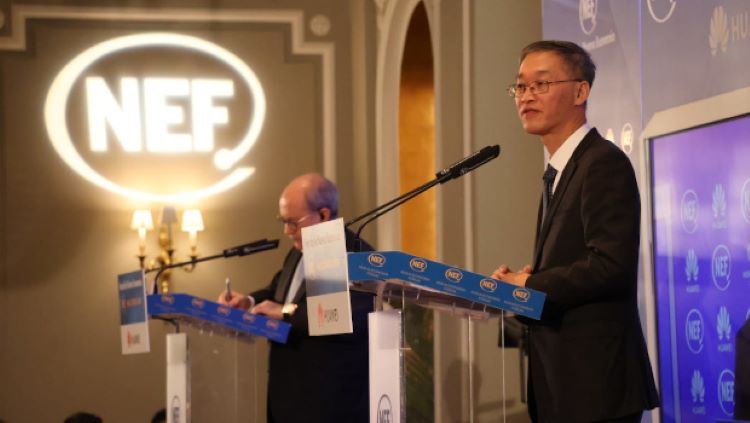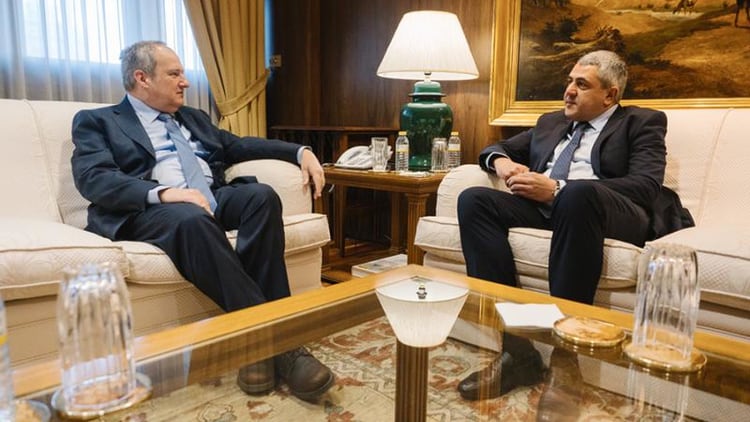Eduardo González
China’s ambassador to Spain, Yao Jing, assured yesterday that his country wants “an early and peaceful reunification” with Taiwan, but warned that his country will reject any “international call in favor of the independence” of the island, because it is “an internal matter” and a “red line that the Chinese Government does not want to cross.”
“The Chinese Government would like to see an early and peaceful reunification, we would like to see or have a peaceful agreement with the Taiwan issue,” Yao declared during an informative breakfast organized in Madrid by New Economy Forum. “We have never changed our policy in this regard, but we hope that the international community understands and supports this ‘one China’ policy,” because it is “an internal matter, all nations have their internal affairs and this is an issue.” historic” for Beijing, he warned.
“For us it is all very simple: there is only one China, this is an international consensus, it is also a United Nations resolution,” he said. “When we establish any type of diplomatic relationship with any country, for example between China and Spain, there is always an article about the one-China policy,” he said. “It is something historic, a historical inheritance, a legacy. We do not want to see the so-called independence of Taiwan develop, because it is part of China and this is a red line that the Chinese Government does not want to cross,” he insisted.
For this reason, the ambassador warned that this dispute should not be “internationalized” to prevent it from becoming a bigger problem. “We do not want any type of call, domestically or internationally, in favor of independence,” he stated. “We don’t want this national problem to become an international problem,” he concluded. Therefore, “whatever the result of the elections” being held today Saturday in Taiwan, “whatever political party enters the Government, this ‘one China’ policy, this principle, must be respected,” he concluded.
USA, Ukraine and Gaza
Regarding relations between China and the US, the ambassador acknowledged that they are going through a “complicated” moment due to some “very specific police forces” in Washington, but he was somewhat optimistic after the summit last November in San Francisco between the presidents. of China and the United States, Xi Jinping and Joe Biden, in which “both parties have returned to communicate better and contacts have resumed.” “We want to have peaceful coexistence and not have these types of conflicts or suspect each other,” but “these relationships have to be based on justice,” he added.
Regarding Russian aggression against Ukraine, the ambassador assured that China “would like to see, of course, a quick end to the conflict, because this is not positive for anyone.” For this reason, he indicated, his country is working “in its own way” to achieve “a ceasefire and an end to the military conflict” and, at the same time, so that “the parties to the conflict see their concerns and security problems resolved.” “This is what we call security based on cooperation and understanding,” to prevent Ukraine from becoming a “frontier of confrontation” between the main powers, he added.
Regarding the other major current war conflict, Yao praised “the effort that Spain and other countries in the European Union have made to achieve peace and stability in the Middle East.” “In China we have a position similar to that of Spain and an approach also very similar to that of the Spanish Government; In fact, I have spoken a lot with my colleagues in the diplomatic corps and with foreign officials and I have seen that Spain and China, more or less, are on the same page, that is, we want a ceasefire, we also want to see the entry of humanitarian aid, we also want to see a two-state solution,” he said.
Tourism and 5G
Radically changing the subject, Yao Jing assured that the Embassy is doing “everything possible” so that the travel agencies of his country attend the next edition of the Madrid International Tourism Fair (Fitur) in order to recover the volume of Chinese tourists that there were before COVID-19. According to the ambassador, the number has fallen from 800,000 tourists before the pandemic to 300,000 last year. “We still have a lot to do to encourage Chinese tourists to visit Spain and it is one of our main tasks at the Embassy,” he declared.
With the same objective, he asked the Spanish ambassador in China, Rafael Dezcállar, present at the event, to help with the issue of visas, “because that takes time and also affects tourism. Sometimes it takes a long time for Spaniards to issue visas, so please give us a hand, help us get more Chinese tourists to Spain,” he concluded.
Finally, the ambassador regretted the veto of European institutions and countries like Spain against Chinese technology companies in the deployment of 5G networks. “5G technology is very positive for everyone” and some Chinese companies, such as Huawei, have developed “less expensive technology,” he explained.
“Unfortunately, some countries do not want to have Chinese technology, they do not want a Chinese technology company to provide this magnificent service to the rest of the world, and these companies can no longer provide, due to sanctions, the least expensive technology for all consumers,” he explained. As a result, he warned, “consumers will now have to pay the cost of these types of political restrictions, now they have to pay more for the internet, they have to pay more for these networks, and this is not good.”







